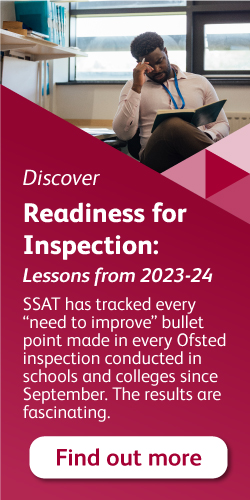
My previous blog queried whether the data about ‘need to improve’ comments from inspection reports since January might be pointing towards an ‘Oliver effect’. I was exploring whether there were any discernible trends and microtrends during the first stages of the new HMCI’s period in charge that might suggest longer term intention.
You can read that post here, but a summary of the key points are:
- Inspections appear better at recognising school strengths ahead of weaknesses.
- Behaviour and attitudes comments becoming noticeably more frequent in reports.
- Attendance issues represented the biggest increase in focus for inspections.
- Assessment continues to be, and has strengthened, as the most common concern.
- Outcomes and progress had more than trebled in frequency as a need to improve.
- Disadvantage occurring more often, notably around attendance and achievement.
- Behaviour comments focusing more on school processes than upon students.
- Increased focus on leadership of schools and a decreased focus on governance.
I concluded that post by stressing that the data would need to be supplemented with a focus on what the Chief Inspector said and did, to help schools identify the future direction of travel. With the publication of the outcomes of Ofsted’s Big Listen, we now have that direction, and it largely mirrors the data from inspection reports conducted between January and July this year.
Here are just a few examples from the Big Listen outcome report and how they align with the bullet points outlined above drawn from our analysis of our ‘inspection tracker’ data:
- Inspections appear better at recognising school strengths ahead of weaknesses
“Inspections should be rigorous, for the sake of the children and learners. But they should not be so intense that they cause leaders to feel so anxious that inspection becomes a process to ‘get through’. Inspections should be an opportunity to showcase achievement and good practice.”
- Behaviour and attitudes comments becoming noticeably more frequent in reports
“Children told us that they want us to prioritise their happiness and welfare in our inspections. They also want us to look at how well they are taught, and their behaviour. We will reflect that in our changes to the way we inspect and report on schools. Our report cards will include how schools are supporting children’s happiness and well-being.”
- Attendance issues represented the biggest increase in focus for inspections
“We will work with the government to introduce a new annual safeguarding, attendance and off-rolling review. The review will look at how schools meet their duties around safeguarding, work to increase attendance and clamp down on off-rolling.”
- Assessment continues to be, and has strengthened, as the most common concern
“We have set up 7 external reference groups [including one on curriculum, teaching and assessment]. They will give us independent advice and challenge from leading experts across the full breadth of our work.”
- Outcomes and progress had more than trebled in frequency as a need to improve
“We will be clear that the outcomes children and learners achieve sit at the heart of an inspection and our risk assessment of providers. This includes both academic and non-academic outcomes.”
- Disadvantage occurring more often, notably around attendance and achievement
“We expect to see schools breaking down barriers for disadvantaged and vulnerable children. We want to support schools to reverse the widening gap between those children and their peers. This is why we will consult on introducing a criterion on inclusion within the report card. It will evaluate whether schools are providing high-quality support for disadvantaged and vulnerable children. “
- Behaviour comments focusing more on school processes than upon students
“Importantly, we will not penalise schools that use suspensions and exclusions legitimately. We will focus on whether behaviour policies and practices are appropriate and whether the school uses suitable, high-quality registered AP.”
- Increased focus on leadership of schools and a decreased focus on governance
Leadership is mentioned eighteen times in the ‘Schools’ section of the Big Listen report. Governance is only mentioned twice, once to signal their involvement in consultation and once to suggest that “inspection should align with the governance structures of schools and the bodies responsible for supporting leaders”.
Conclusions
The Big Listen outcomes report can be seen as part of a drawn-out process of reflection and redefinition on the part of the inspectorate under Sir Martyn Oliver. It can also be seen as reflecting changes that the Chief Inspector has wanted to see since his appointment to the role. We can conclude the latter part of this analysis from the data emerging from inspections since January (the Big Listen consultation was launched in March).
Some of the outcomes from the Big Listen can also be seen in the HCMI’s application for the role. On outcomes, he wrote that “we require a caring and compassionate inspectorate and regulator who never loses sight of the need to support increasingly high outcomes for children”. In the next line, he articulated a view that “Ofsted should be the children’s champion and particularly champion those who are most vulnerable”, which is in keeping with the focus on disadvantage present in both the inspection data and the consultation response.
And so, there is the classic ‘chicken and egg’ conundrum in interpreting the recommendations emerging from the Big Listen exercise. How far are they the product of the insights given by the 20,000 contributors and how far are they a reflection of the intentions of the Chief Inspector (or indeed of the new government overseeing his work)? Perhaps we will never know and perhaps the findings of the consultation have muddied these waters too much for us to be able to conclude definitively: it is striking how many responses cited in the report lie between 41% and 59% of respondents.
One issue that the sector will have with the consultation response is that it unpicks the statement in Oliver’s application letter that “the system does not need a new framework imposed upon it”. We are getting one, although it is arguable that this has been driven by the change in government more than the change in HMCI. The trick that Sir Oliver now needs to carry out effectively is to hold onto the positive headlines and, more importantly, positive impressions from many education professionals, that he has garnered through some of the (possibly easier) decisions he has made in responding to the consultation.
Our sector now enters a period of consultation around the (possibly harder) changes that flow from the Big Listen outcomes. That period looks like lasting for most of the 2024/25 academic year.
At SSAT, we will continue to monitor the outcomes of all inspections, particularly the ‘need to improve’ comments that appear to foreshadow decisions being made by the HMCI and his team. And we will continue to share these with you through regular webinars.
Readiness for Inspection: Insights for school leaders
Is your school in the inspection window? Do you know which aspects of the inspection framework carry the greatest risk for schools and their leaders? Have you wondered what inspection reports can tell you that will help your preparation? You are in the right place.

